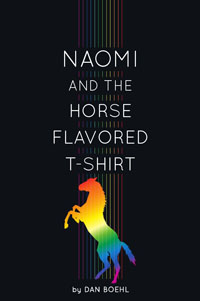Blog Is Still a Four-Letter Word

Monday morning. Cold cat-nose, green tea, sleepy checking of email. Among the messages, one from my workshop leader, asking if I could stop by her office to talk before class.
Back up, explain: I’m a brand-new, first-semester PhD student in a creative writing program. I’m a poet; I’m a woman; I’m forty-two. And I moved to this city exactly three months ago to start the program. It was an astonishing stroke of good fortune to get accepted, and I was deeply excited to move here and to do good work. But I’d be lying if I didn’t say that these three months have felt pretty much like trying to drink from a firehose.
That’s okay—that’s how it is when you’re somewhere new. New city, new acquaintances, new university bureaucracies and departmental eccentricities. A new roomful of bright undergraduate faces staring up at me three mornings a week. It’s a struggle to adjust, but as more or less a career academic (in the sense that I career among institutions, jostling back and forth around and between them), I’m used to transitions and I’ll be here for the next five years. I’m a little daunted, but not too badly. I may weeble but I don’t fall down.
Nonetheless when my workshop leader asked me to come chat with her, I was grateful. I knew she’d met one-on-one already with the other members of the class to discuss their writing; they said she’d been extremely helpful and frankly I kind of felt like I needed some extreme help, to get through the whole drinking-from-a-firehose part of the experience. I felt optimistic about maybe getting a dab of reassurance from her—that thin trickle of validation that lets you know there’s some point in continuing the effort.
Imagine, then, if you will, my surprise. READ MORE >
Beecher’s and the Game Narrative
Perhaps it is a reaction to the interactive time we live in—where video games and the Internet create portals to different worlds, where we control the x,y,z—but Beecher’s, in its inaugural issue, has curated, whether they are aware of it or not, a small collection of fiction and poetry that exist in two places: a realm of narrative and that of the participatory game.
The first, striking example of the journal’s interactive nature is the design. That point may seem self evident—you interact with the journal as you would with any other book—but there is something more to Beecher’s. The pages are porous. They absorb dirt, fingerprints, and oil. The binding is loose. When it is in your grasp, you are handling something precious, an antiquity. A person like myself, who believes in the preservation of items, finds that holding the journal, attempting not to damage it, is a thoroughly conscious process.
The journal being physical as opposed to electronic means you can’t click links in Beecher’s as you would in a hyper-text journal. The writing has to works harder to to encourage reader interaction. Here is where the journal begins to push real boundaries.
In Rebecca Wadlinger’s poem, “Mrs. Mayfield and the Museum of Bodies,” the narrator touches statues and paintings in an unnamed museum under the suspicious gaze of a security guard. When the guard blinks, the narrator/poet sneaks a touch. The guard, by the end of the poem, is so worn down by the narrator’s persistence that he allows her to interact with the art, finally, as she truly desires.
Cohen’s “The Rules (Gulf Version),” is a set of game rules which informs the reader that any number of people may participate in the game/narrative, as long as they are human like you and me. But, for practical purposes, the participants in the game must “exceed one”, drawing the reader into the “game.” During my interaction with the story, I was forced to wonder whether I was playing a game with the author, or with the characters of the story. Either way, a dead body became a heavy load at the end of the story, requiring redemption and resuscitation that only I, as the reader and participant in the game, could supply. READ MORE >
(Eggs and Bacon): The Poem as Memoir?

What is memoir in poetry? We read prose memoirs and see how lives are stretched taut around themes: a chronology of water, a debilitating illness, a drug addiction, a nomadic childhood, a strange religion, insomnia-driven thinking. Themes become umbrella girding; living, the fabric that fills it out. But where does poetry fit into memoir? We could think about the confessional in poetry and say, yes this is the place where poetry and memoir meet. Plath on suicide attempts: “I have done it again. / One year in every ten / I manage it–” or Lowell, “My mind’s not right…I myself am hell.” Depression and mania are easily encapsulated states of being, but all poets write their lives, confessional or not. When Simic writes, “My mother was a braid of black smoke,” we assume he’s not writing fact-truth. Maybe he’s writing dream truth or metaphor truth. Maybe he’s just writing, and I’m extrapolating.
I started thinking about this when a poem of mine called “Man Builds a Guitar” went up online recently. It’s basically a persona poem in Jack White’s voice. I wrote it after watching the documentary It Might Get Loud and not being able to shake Jack White’s weird tinkering and instrument making from my head. So, it’s a persona poem, but it embodies themes and emotions I was thinking about at that particular moment in time. When I say, “I heard everything disappearing” what I meant was that my marriage was over and life as I knew it was evaporating in front of my eyes. I’m using the imagery of my childhood in the South and the sounds that take me back there to get at the particulars of silence-after-a-storm. This is a memoir poem even though it’s a persona poem. I mean, I don’t know Jack White, but I know me.
Matt Hart has a poem called “Sailing the Gut Boat,” that begins, “I made you a thing with no tongue / and gallons of new-fangled fog. I made you / a thing with nothing and nobody—not even / a surrealist screaming into an atlas….” Hart reminds us that you can fashion people and events into whatever you want (a nothing, even) on the page, but the truth of them still remains behind that fashioning.
Or take a short couplet poem, “Future,” by Emily Kendal Frey:
To Afford Polyvalence
In Spheres III, I attempt to explain why we should not only purge the two portentous words revolution and mass from our vocabulary, but also the concept of “society.” It suggests a coherence that could only be achieved by violent asserting conformism. The conglomerate of humans that has, since the 18th century, called itself “society” is precisely not based on the atomic dots that we tend to call individuals. Instead, it is a patchwork of milieus that are structured as subcultures. Just think of the world of horse lovers—a huge subculture in which you could lose yourself for the duration of your life but which is as good as invisible if you are not a member of it. There are hundreds if not thousands of milieus in the current social terrain that all have the tendency from their own viewpoint to form the center of the world and yet are as good as nonexistent for the others. I term them inter-ignorant systems. And, among other things, they exist by virtue of a blindness rule. They may not know of one another, since otherwise their members would be robbed of the enjoyment of being specialized members of a select few. In terms of their profession, there are only two or three types of humans who can afford polyvalence in dealing with milieus. The first are architects who (at least virtually) build containers for all; the second are the novelists, who insert persons from all walks of life into their novels; finally come the priests who speak at the burials of all possible classes of the dead. But that is probably the entire list. Although, no, I forgot the new sociologists à la Latour.
In other words, the multiple personality on the one hand and the single networker on the other— those are the two options I see open to individualized populations. The way homo sapiens is influenced by the dowry from the days of hording is no doubt insurmountable, but because the explication of that old heritage continues simultaneously in various directions, the proto-social elements of the life of sapiens can be reworked. They lead to an electronic tribalism. In the dyadic motifs, by contrast, the intimate relationships are explicated to such a degree that intimacy can quite literally be played through with the technical media of self-supplementation. In the long run, human types arise that are fairly unlike what we have known to date.
Sunday Service: Mike Lala Poem
Mt. Rushmore Poem
Six thousand pounds of dynamite
for the father of my country.
A chisel for God’s messenger, detained.
A hammer as his cue:
Washington: Bring the money.
Jefferson: It’s soft.
Borglum: Move behind Washington, and Roosevelt, back.
South Dakota: It’s odd here.
Italy: It’s old.
Michelangelo: That’s freedom: a new face in an old place.
Han Solo: I know.
I stood at the rail, put a quarter in, and received my 90 seconds
set aside for detail:
Theodore, sweating,
Tom staring off at the hills.
Abraham, in absentia,
George, chest out.
Susan B. Anthony (at home): All rise for the Federal Boys Club.
Roosevelt (to tourist): Take the fucking photo.
Jefferson (erected): Leave your likeness where they worship.
The stationary viewer clicked closed, and mother
led me to Crazy Horse in-progress. I looked at the mountain,
the face emerging from it, then the plaster mockup
on the boardwalk by the gift shop.
Ziolkowski (on his death bed): Do it slow. Do it right.
He has been honored by the U.S. Postal Service
with a 13-cent stamp.
Michael Lala grew up mostly in the western United States and Tokyo, and studied writing in Michigan. He is the author of the chapbooks [fire!] ([sic] Detroit, 2011) and Under the Westward Night (forthcoming, Knickerbocker Circus New York, 2011), and he curates Fireside Follies, lives, and works in Brooklyn. mikelala.com.
What do you do on Saturdays between waking up hungover/alone and going out/drinking?
Song for Bob Dylan

In 1988, I spent my month’s allowance on Guns n’ Roses’ “Appetite for Destruction,” and was unwittingly yet gleefully met by a stunning illustration on the inside cassette flap of a disoriented woman having just been sexually assaulted or raped. At 12 years of age, I think I understood the sociopolitical significance of the image — that it was “bad”; that rape and physical violence towards women was “bad”; that a hard rock band had a vested economic interest in conveying the image of themselves as “bad,” yet there was still a part of me, perhaps the majority, that simply, essentially, found the cotton stretched panties and exposed plump breast extremely erotic. I may have even unsuccessfully masturbated to the picture; I kept saying “this is a cartoon” to myself as I eventually grew flaccid. More than two decades later, today, knee-deep in Occupy Wall Street media k-hole, I came across a picture of a young protester, perhaps in need of some originality, reading a book that could be anywhere from Twilight to Chomsky’s greatest hits. And guess what I thought? What image immediately came into my mind. I know this is “bad,” that my adult male brain has been hijacked and permanently fucked by the images, album covers, videos, proposed by “bad” rock n’ roll boys who ostensibly were writing songs about how I felt, my unsettled and unsettling emotions, somehow, somewhat, probably not. David Bowie’s “Song for Bob Dylan” (1971) offers the lyric you gave your heart to every bedsit room / at least a picture on my wall / and you sat behind a million pair of eyes which honors Dylan’s voice as being that of his generation. Decades only happen once, but they take ten years to happen, and that is a enough time to get bored. I was born already tired of the 60s. Children dream of perfect worlds, and adults resent and lament the missed opportunities. It is touching, really. This slow dance between frowning parties that never ends. Cobain is dead, and Bieber’s voice is still of a eunuch’s, so maybe our reposed protester can only settle for a sign printed in caps, a sign she doesn’t hold, but places between her legs.
Pleasant and Painful Experiences

1.
A few weeks ago, Glen Duncan reviewed Colson Whitehead’s Zone One and he certainly got a vocal reaction, not necessarily because it was a less than glowing review but because of how he wrote the review, the strange and insulting analogies he made and so on. In his review he, among other things, attempts to predict what those ultimate arbiters of literary taste–Amazon.com reviewers–might have to say. As he discusses the literary nature of the novel, Duncan writes, ” We get, in short, an attempt to take the psychology of the premise seriously, to see if it makes a relevant shape.” He also revisits this idea of porn starts, throughout. Ooh! He said porn star in a literary review! Edgy! Today, he wrote a defense (???) of his review. He responded to the criticism of his criticism with more criticism! Meta! The follow up can be summarized thusly: You are all haters who didn’t understand what I wrote.
On Place Memory, The Other Side, and Yelp as a Forum for Political Debate
 + Wednesday night I found myself standing in a ballroom on Wall Street in line for coat check beside a librarian who was wearing a button that said “Tax The Rich.” Ignoring her button, you’d think we were the rich (and, in a way, just being invited to pretend to be rich for a night is a kind of wealth) but this was after-party for the National Book Awards and the opulent and gigantic room was filled with writers, publishing folk, and journalists. Many people in the room were a part of the Occupy Writers movement, had participated in the protests or had at least covered them.
+ Wednesday night I found myself standing in a ballroom on Wall Street in line for coat check beside a librarian who was wearing a button that said “Tax The Rich.” Ignoring her button, you’d think we were the rich (and, in a way, just being invited to pretend to be rich for a night is a kind of wealth) but this was after-party for the National Book Awards and the opulent and gigantic room was filled with writers, publishing folk, and journalists. Many people in the room were a part of the Occupy Writers movement, had participated in the protests or had at least covered them.
+ Two months ago, on the first day of Occupy Wall Street, this video caught a smug gathering of the “1%” (whether just figuratively or actual) sipping champagne in a balcony just above the street, waving and laughing at the protestors as they marched and chanted. That balcony was attached to this place, Cipriani, a restaurant and luxury venue for galas and awards ceremonies and fundraisers.

+ As I walked up to the massive, castle-fortress at 55 Wall Street, I could not unlatch it from the image of the smug, clueless champagne sippers. I know that that those people did not have fangs and yellow eyes but in my memory they have fangs and yellow eyes. Now I was standing here, dressed up in a way I am not often dressed and standing among rented tuxes. I felt out of place, but all the friends I saw at the after-party felt similarly out-of-place, so our cumulative out-of-placeness, in a way, placed us.
Been there, bought the T-Shirt: Interview with Dan Boehl
 Naomi and the Horse-Flavored T-Shirt
Naomi and the Horse-Flavored T-Shirt
by Dan Boehl
Self-published, 2011
200 pages / $12.99 Buy PB from Lulu, Buy Kindle from Amazon
Forgetting books on airplanes should be a genre of poetry community service. I was in Terminal A of the Baltimore airport when I realized my copy of Dan Boehl’s Kings of the F**king Sea was still on the plane in Terminal B. No, I was only halfway through! So I hurried back to rescue it from the pocket with the barf-bag and instruction manual on how to save yourself with a seat cushion once you land in the ocean. Before the plane pushed, the gate agent let me search for the book, disturbing a few passengers, finally spotting the Kings cover atop a recent issue of SkyMall. I asked the passenger who had taken my place if he could hand it to me. He grabbed Kings, processed the cover, and said frankly, “Oh. Yes. Here. I wouldn’t be reading that.”
November 18th, 2011 / 12:00 pm

